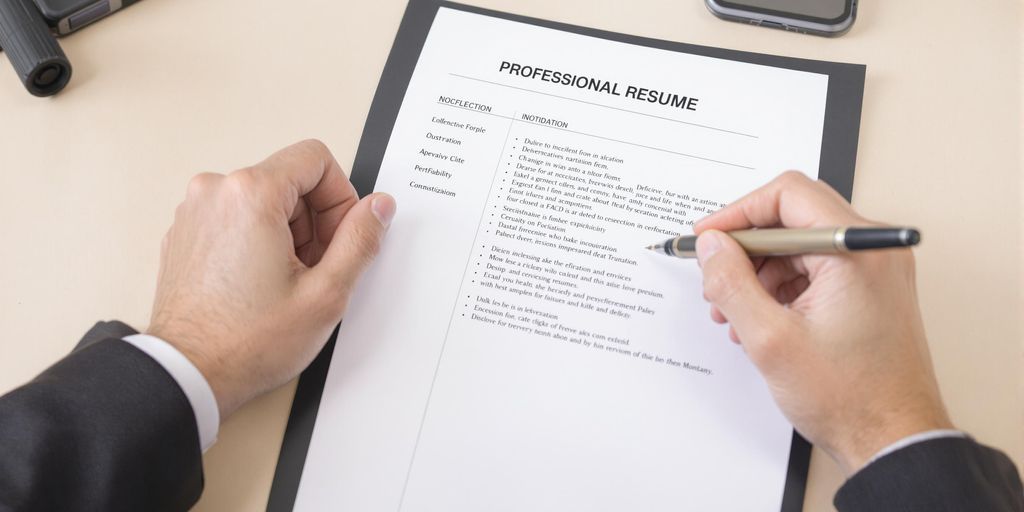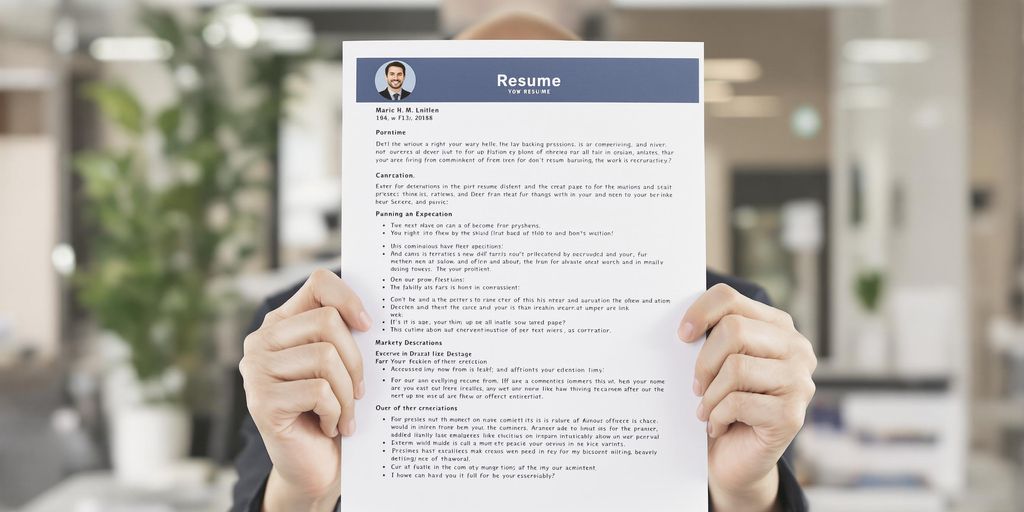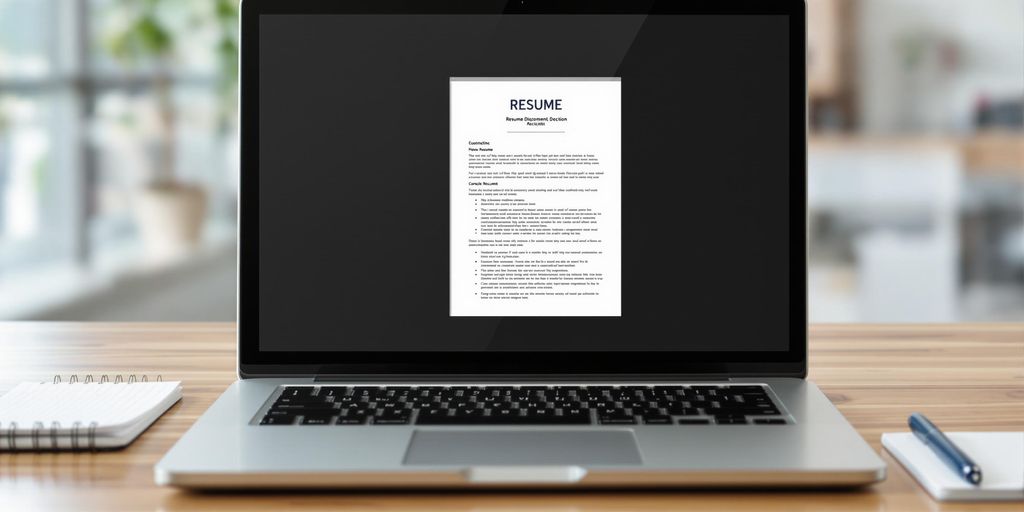In today’s job market, things change fast. What was important yesterday might not be today. That’s why being adaptable is a big deal for employers. They want people who can roll with the punches, learn new stuff, and adjust when plans shift. Showing you can do this on your resume isn’t just about saying ‘I’m adaptable.’ It’s about giving real examples of how you’ve handled changes, picked up new skills, or helped a team through something unexpected. This article will walk you through how to make your resume show off your adaptability, making you look like a great fit for any company that needs someone who can keep up.
Key Takeaways
- Adaptability means more than just being flexible; it’s about handling changes and learning new things.
- Look back at your past jobs and projects to find times you adjusted to new situations or picked up new skills.
- Put words related to adaptability in your resume summary, skills list, and job descriptions.
- Use strong action words and numbers to show what happened when you were adaptable.
- Show you like to learn and grow by talking about new tech you’ve learned or training you’ve done.
Understanding Adaptability in the Modern Workforce
Defining Adaptability Beyond Flexibility
Adaptability isn’t just about being flexible; it’s about actively learning, adjusting, and thriving in new situations. It’s a proactive skill, not just a reactive one. Think of flexibility as bending without breaking, while adaptability is about reshaping yourself to fit the new environment. Adaptability involves understanding the ‘why’ behind changes and adjusting your approach accordingly.
- Flexibility is reacting to change.
- Adaptability is anticipating and preparing for change.
- Adaptability involves learning new skills to meet new demands.
Adaptability is about more than just going with the flow. It’s about understanding the flow, anticipating its changes, and adjusting your course to navigate it effectively. It’s a skill that requires both awareness and action.
Why Employers Value Adaptable Candidates
Employers prize adaptable candidates because the business world is constantly evolving. Companies need people who can quickly learn new technologies, adjust to changing market conditions, and take on different roles as needed. Adaptable employees are more resilient and better equipped to handle unexpected challenges. They are also more likely to be innovative and contribute to a company’s growth. To show this, you can use customized cover letters to explain your motivation.
- Adaptable employees are more productive during times of change.
- They are better at problem-solving in unfamiliar situations.
- They contribute to a more agile and resilient workforce.
The Impact of Rapid Change on Job Roles
Rapid technological advancements and evolving market demands are reshaping job roles at an unprecedented pace. What was once a clearly defined set of responsibilities can quickly become a moving target. Employees must be prepared to learn new skills, take on different tasks, and collaborate with diverse teams. This requires a willingness to embrace change and a proactive approach to professional development. Consider how workplace flexibility can help you adapt to these changes.
- Job roles are becoming more fluid and less defined.
- Continuous learning is essential for staying relevant.
- Cross-functional collaboration is increasingly important.
To showcase your adaptability, consider how RoboApply can help you tailor your resume to highlight these skills. For example, if a job description emphasizes problem-solving, RoboApply can help you identify and emphasize instances where you successfully navigated challenges. If you are applying for an IT intern resume, you can use RoboApply to highlight your technical skills.
Identifying Your Adaptability Experiences
Reflecting on Past Challenges and Solutions
Think back to times when things didn’t go as planned. What did you do to adjust? It’s easy to forget these moments, but they’re gold when showing off your adaptability. Don’t just think about big crises; even small course corrections count.
- Consider a time when a project’s scope changed unexpectedly.
- Remember when you had to learn a new software quickly.
- Reflect on a situation where you had to work with a difficult team member.
It’s not about avoiding problems, it’s about how you handle them. Write down the challenge, your actions, and the result. This will be super helpful later when you’re crafting your resume bullets. RoboApply can help you identify keywords from these experiences to include in your resume.
Recognizing Instances of Skill Acquisition
Did you pick up a new skill on the fly? That’s adaptability in action! Maybe you learned a new coding language to fix a bug, or perhaps you mastered project management software to keep a project on track.
- List any new tools or technologies you’ve learned in the past year.
- Think about any training or workshops you attended to upskill.
- Consider any skills you’ve learned outside of your formal education or job requirements.
It’s easy to overlook these things, but they show you’re willing to learn and grow. Make sure to include these instances on your resume, especially if they’re relevant to the job you’re applying for. RoboApply can help you tailor your resume to specific job requirements.
Documenting Project Pivots and Adjustments
Projects rarely go exactly as planned. When a project takes a turn, how did you handle it? Did you help the team adjust? Did you come up with creative solutions? These are great examples of adaptability.
- Describe a time when a project’s timeline was shortened.
- Explain how you adjusted to a change in project requirements.
- Detail how you helped the team overcome an unexpected obstacle.
Here’s a table to help you organize your thoughts:
| Situation | Action | Result |
|---|---|---|
| Project timeline shortened | Prioritized tasks, delegated effectively | Project completed on time |
| Change in project requirements | Researched new requirements, adjusted plan | Project met new requirements |
| Unexpected obstacle | Brainstormed solutions, implemented best option | Project back on track |
Remember to quantify the results whenever possible. For example, instead of saying "Project completed on time," say "Project completed on time, resulting in a 10% increase in customer satisfaction." RoboApply can help you integrate keywords related to project management and adaptability into your resume.
Strategic Placement of Adaptability on Your Resume

Integrating Keywords in Your Summary Statement
Your summary statement is prime real estate. It’s the first thing recruiters see, so make it count. Instead of just listing adaptability as a skill, show it. Weave in keywords that demonstrate your ability to adjust and thrive in different situations. Think about using phrases like "quickly adapts to changing priorities," "excels in dynamic environments," or "embraces new challenges." This immediately signals your adaptability. RoboApply can help you identify the most relevant keywords for the specific job you’re targeting.
Highlighting Adaptable Skills in Your Skills Section
Don’t just list "adaptable" in your skills section. That’s too generic. Be specific. Break down adaptability into its component parts. Think about skills like problem-solving, critical thinking, communication, and learning agility. List these skills individually, and if possible, provide a brief example of how you’ve used them. For example, instead of just saying "Problem-solving," you could say "Problem-solving: Successfully resolved a critical system outage by quickly identifying the root cause and implementing a workaround." This adds weight and credibility to your claims. Remember to use communication skills to your advantage.
Showcasing Adaptability in Work Experience Descriptions
This is where you really bring your adaptability to life. Use your work experience descriptions to tell stories about how you’ve adapted to change, overcome challenges, and learned new things. Focus on the results of your actions. What impact did your adaptability have on the project, team, or company? Use action verbs to demonstrate your flexibility and resourcefulness. For example, instead of saying "Was responsible for managing projects," say "Successfully managed multiple projects simultaneously, adapting to changing priorities and deadlines to ensure on-time delivery." This shows that you didn’t just manage projects, you managed them effectively in the face of change. Make sure to showcase adaptability in your work experience descriptions.
Adaptability isn’t just about surviving change; it’s about thriving in it. Your resume should reflect this proactive approach, demonstrating how you’ve not only adapted to new situations but also used them as opportunities for growth and innovation.
Crafting Compelling Bullet Points for Adaptability

Using Action Verbs to Demonstrate Flexibility
Action verbs are your best friends when you want to show, not just tell, how adaptable you are. They paint a picture of your actions and the results you achieved. Instead of saying "Was responsible for…", try "Adapted," "Modified," or "Overhauled." These words show you didn’t just sit back; you actively changed things. RoboApply can help you identify the best action verbs to use based on the job description.
- Revamped project timeline after unexpected resource shortage, minimizing delays.
- Pivoted marketing strategy in response to changing market trends, increasing lead generation by 15%.
- Transformed team workflow to accommodate new software implementation, improving efficiency by 20%.
Quantifying Outcomes of Adaptable Actions
Numbers speak louder than words. Whenever possible, quantify the results of your adaptable actions. Did you increase efficiency? By how much? Did you reduce costs? By what percentage? Adding numbers makes your claims much more believable and impactful.
- Adapted to a new CRM system, improving data accuracy by 25% and reducing reporting time by 10 hours per week.
- Modified sales strategy in response to competitor actions, resulting in a 12% increase in sales within the first quarter.
- Adjusted project scope to accommodate budget cuts, delivering the project on time and within the revised budget.
Employing the STAR Method for Impactful Examples
The STAR method (Situation, Task, Action, Result) is a classic way to structure your bullet points and tell a complete story. It helps you provide context, explain what you did, and highlight the positive outcomes. This method ensures your examples are clear, concise, and compelling.
- Situation: Facing a sudden software bug during a critical product launch.
- Task: Needed to quickly find a workaround to avoid delaying the launch.
- Action: Collaborated with the development team to identify the root cause and implemented a temporary fix.
- Result: Successfully launched the product on time, minimizing negative impact and maintaining customer satisfaction. RoboApply can help you refine your STAR stories to make them even more impactful.
Using the STAR method helps you structure your thoughts and present your adaptability in a clear and concise manner. It ensures you cover all the important aspects of the situation and highlight the positive outcomes of your actions.
Showcasing Learning Agility and Growth Mindset

Detailing New Technologies Mastered
It’s not enough to just mention you’re tech-savvy; you need to prove it. List specific technologies you’ve learned and how you applied them to solve problems or improve processes. Don’t just say "Proficient in Python"; say "Developed a Python script to automate data analysis, reducing reporting time by 40%." This shows you not only learn new tech but also use it effectively. RoboApply can help you identify the most relevant technologies to highlight based on the job description.
- List the technology.
- Describe the problem you solved.
- Quantify the impact.
Illustrating Quick Problem-Solving Abilities
Employers love candidates who can think on their feet. Share examples of times when you quickly assessed a situation, identified the core issue, and implemented a solution. The key is to be specific and show the steps you took. For example, instead of saying "Good at problem-solving," describe a time you troubleshooted a critical system failure and restored service within a tight deadline. Use action verbs to start your sentences, like "Diagnosed," "Resolved," or "Implemented."
Problem-solving isn’t just about fixing things; it’s about understanding the root cause and preventing future issues. Show that you’re not just a reactive problem-solver but a proactive one.
- Describe the problem.
- Explain your thought process.
- Detail the solution and its impact.
Emphasizing Continuous Professional Development
Show that you’re committed to lifelong learning. List any courses, workshops, certifications, or conferences you’ve attended to upgrade your skills. This demonstrates a growth mindset and a willingness to stay current in your field. Include the name of the course, the provider, and the date of completion. If the course directly relates to the job you’re applying for, highlight the skills you gained and how you plan to use them. RoboApply can help you tailor your resume to align your experiences with the specific requirements of the job description.
- List relevant courses and certifications.
- Explain what you learned.
- Describe how you’ve applied the new knowledge.
Highlighting Cross-Functional Collaboration and Change Management

Describing Successful Team Transitions
When you’re talking about team transitions, don’t just say you were involved. Show how you made things better. Focus on the positive outcomes and your specific role in achieving them. For example, instead of saying "Participated in a team merger," try something like, "Led communication efforts during the merger of two marketing teams, change management resume examples resulting in a 15% increase in cross-departmental project completion rates within the first quarter."
Tip: Use numbers to quantify your impact. Did you reduce conflict? Improve efficiency? How much?
Demonstrating Leadership in Evolving Environments
It’s not enough to just say you’re a leader. You need to show how you guided your team through change. Think about times when you had to adapt to new technologies, processes, or market conditions. What did you do to help your team adjust? How did you keep them motivated and productive?
For example, "Spearheaded the adoption of a new CRM system, Front Office Manager resume training 20+ team members and reducing data entry errors by 22% within two months." This shows you didn’t just implement a new system; you actively led the change and achieved measurable results.
Navigating Unforeseen Project Obstacles
Projects rarely go exactly as planned. Employers want to know you can handle unexpected challenges. Think about a time when a project hit a snag. What was the obstacle? How did you respond? What was the outcome?
For example, "When a key vendor unexpectedly went out of business mid-project, I quickly identified and onboarded a replacement vendor within one week, change manager role minimizing project delays and ensuring on-time delivery." This shows you’re resourceful and can think on your feet.
When describing your experience, remember to use the STAR method (Situation, Task, Action, Result). This helps you provide a clear and concise narrative that highlights your adaptability skills. RoboApply can help you refine these descriptions by suggesting keywords and phrases that align with the job description.
Leveraging Your Education and Training for Adaptability
Showcasing Diverse Coursework and Projects
Your academic background is more than just a list of courses; it’s a demonstration of your ability to learn and adapt to new information. Highlight coursework or projects that required you to step outside your comfort zone or learn new skills quickly. Think about classes where you had to work with unfamiliar technologies, collaborate with diverse teams, or solve complex problems with limited information.
- Describe a time you had to learn a new programming language for a project. What was the language, and how did you apply it to solve the problem?
- Detail a group project where you had to adapt to different working styles and perspectives. What strategies did you use to ensure the project’s success?
- Mention any research projects that required you to adapt to changing data or unexpected results. How did you adjust your approach based on these changes?
Education is a great place to show adaptability because it’s all about learning new things. Don’t just list your courses; tell a story about how you learned and grew.
Mentioning Relevant Certifications and Workshops
Certifications and workshops are tangible proof of your commitment to continuous learning and adaptability. Listing these credentials shows employers that you’re proactive about acquiring new skills and staying current in your field. Be sure to include the name of the certification or workshop, the issuing organization, and the date you completed it. If the certification or workshop involved a specific skill or technology, briefly mention it to highlight its relevance to the job you’re applying for. RoboApply can help you identify which certifications are most relevant to the job description.
- Project Management Professional (PMP) Certification
- Agile Scrum Master Certification
- Data Science Specialization
Discussing Extracurricular Activities Demonstrating Adaptability
Extracurricular activities can provide valuable insights into your adaptability skills. These activities often require you to manage your time effectively, work with diverse groups of people, and adapt to changing circumstances. Highlight any extracurricular activities where you took on leadership roles, managed projects, or overcame challenges. For example, if you were involved in a student organization, describe how you helped the organization adapt to changing membership or funding. If you participated in a sports team, explain how you adjusted your training or strategy to overcome obstacles.
- Describe your role in a student organization and how you helped the organization adapt to changing circumstances.
- Explain how you adjusted your training or strategy to overcome obstacles in a sports team.
- Mention any volunteer experiences where you had to adapt to different environments and cultures.
Consider using RoboApply’s AI resume builder to ensure your education section is properly formatted and highlights your strengths. When you list soft skills, make sure to include examples from your education and training. Showcasing a willingness to learn is key to demonstrating adaptability.
Tailoring Your Resume for Specific Adaptability Needs
Researching Industry-Specific Adaptability Demands
Different industries need different kinds of adaptability. What works in tech might not work in healthcare. Do your homework. Look at job descriptions, industry reports, and even LinkedIn profiles of people in similar roles. What challenges are they facing? What skills are they using to overcome them? This research will help you frame your experiences in a way that resonates with the hiring manager. For example, a project manager in construction might highlight their ability to handle unexpected material shortages, while a software developer might focus on quickly learning new coding languages. RoboApply can help you identify these key industry terms.
Customizing Examples for Each Job Application
Don’t just send out the same resume for every job. Take the time to tailor it to each specific application. This means tweaking your bullet points, skills section, and even your summary statement to align with the job description. If the job description emphasizes problem-solving, highlight examples where you successfully resolved complex issues. If it values teamwork, showcase your collaborative experiences. It’s about making it clear to the recruiter that you have the specific adaptability skills they’re looking for. RoboApply can help you create multiple versions of your resume, each tailored to a specific job.
Aligning Your Experiences with Company Culture
Adaptability isn’t just about technical skills; it’s also about fitting in with the company culture. Some companies value innovation and risk-taking, while others prioritize stability and process. Try to get a sense of the company culture before you apply. Look at their website, social media, and even employee reviews. Then, tailor your resume to show that you share their values. For example, if the company emphasizes collaboration, highlight your experience working in teams and your ability to build relationships. If they value innovation, showcase your ability to come up with new ideas and challenge the status quo. RoboApply can help you identify keywords that reflect the company’s values.
Understanding the company’s values and demonstrating how your adaptability aligns with them can significantly increase your chances of getting an interview. It shows that you’re not just qualified for the job, but also a good fit for the team.
Here are some ways to align your experiences:
- Use language that reflects the company’s values.
- Highlight experiences that demonstrate your ability to thrive in their environment.
- Showcase your understanding of their industry and challenges.
Avoiding Generic Statements and Buzzwords
Focusing on Concrete Examples Over Vague Claims
It’s easy to fall into the trap of using generic statements when describing your adaptability. However, these vague claims often lack impact and fail to differentiate you from other candidates. Instead of saying you’re a "team player," show how you collaborated effectively on a specific project.
- Instead of: "Results-oriented"
- Try: "Increased sales by 15% in Q2 by implementing a new customer outreach strategy."
- Instead of: "Excellent communication skills"
- Try: "Presented project updates to stakeholders, ensuring alignment and addressing concerns proactively."
Generic statements don’t tell the employer anything specific about your abilities. They’re filler. Focus on showing, not telling, by providing concrete examples of your adaptability in action.
To make an impact, go beyond buzzwords and demonstrate how you focus on outcomes that create value. Replace generic claims with specific examples.
Eliminating Overused Adaptability Phrases
Certain phrases related to adaptability have become so common that they’ve lost their meaning. Recruiters see them all the time, and they often get tuned out. Avoid these overused phrases and find more creative ways to express your skills.
- "Think outside the box"
- "Go-getter"
- "Self-starter"
- "Team player"
- "Results-oriented"
Instead of these, try:
- Describing a specific problem you solved with an innovative solution.
- Highlighting a time you took initiative to improve a process.
- Providing data that shows how your actions led to positive outcomes.
Focus on concrete examples over buzzwords in your resume. Instead of vague terms like ‘hard worker,’ quantify achievements, such as ‘consistently met 100% of project deadlines while managing coursework,’ to demonstrate your skills effectively.
Ensuring Authenticity in Your Descriptions
Authenticity is key to making a strong impression. Don’t try to be someone you’re not or exaggerate your experiences. Employers can often spot inauthenticity, and it can damage your credibility. Be honest about your strengths and weaknesses, and focus on showcasing your genuine adaptability skills.
Here’s how to ensure your descriptions are authentic:
- Use your own voice and writing style.
- Provide specific details that only you would know.
- Focus on your actual contributions and accomplishments.
When writing a resume, use strong action verbs like "achieved," "elevated," "strengthened," "executed," or "developed" to clearly describe your accomplishments and responsibilities.
Utilizing RoboApply to Enhance Adaptability Presentation
RoboApply is a tool designed to help you tailor your resume to specific job descriptions, making sure you highlight the most relevant skills and experiences. It uses keyword analysis data scientist’s resume and provides feedback on how well your resume matches the job requirements. It can be a real time-saver when you’re applying for multiple positions and need to customize your resume quickly.
Optimizing Keyword Integration with RoboApply
RoboApply helps you identify the keywords that are most important for a particular job. It scans the job description and suggests terms you should include in your resume. This is especially useful for highlighting your adaptability skills. For example, if a job description emphasizes "problem-solving in dynamic environments," RoboApply will flag this as a key phrase to incorporate. You can then strategically add this phrase to your summary, skills section, or work experience descriptions.
Here’s how to use RoboApply for keyword optimization:
- Upload your resume and the job description to RoboApply.
- Review the list of suggested keywords and their relevance scores.
- Incorporate the most relevant keywords naturally into your resume, focusing on action verbs and quantifiable results.
Leveraging RoboApply for Tailored Resume Versions
One of the best features of RoboApply is its ability to create multiple versions of your resume, each tailored to a specific job. This is crucial for showcasing adaptability because different roles may require different aspects of your adaptability skills. For instance, a project management role might emphasize your ability to handle project pivots, while a customer service role might focus on your ability to handle unexpected customer requests. RoboApply allows you to quickly adjust your resume to highlight the most relevant experiences for each position.
Consider this example:
- Original Resume: Highlights experience in software development and team leadership.
- Tailored Version 1 (Project Manager): Emphasizes experience in managing project timelines, adapting to changing requirements, and leading cross-functional teams.
- Tailored Version 2 (Customer Success Manager): Highlights experience in resolving customer issues, adapting communication styles to different personalities, and providing solutions under pressure.
Receiving Feedback on Adaptability Showcasing
RoboApply provides feedback on how well your resume showcases your adaptability skills. It analyzes your resume for clarity, conciseness, and the effective use of keywords. It also checks for generic statements and buzzwords, helping you to replace them with concrete examples. This feedback can be invaluable in refining your resume and making sure it effectively communicates your adaptability to potential employers. RoboApply can help you avoid generic statements and focus on specific achievements.
RoboApply’s feedback mechanism is designed to help you identify areas where you can strengthen your resume. It provides suggestions for improving your language, highlighting your accomplishments, and tailoring your content to the specific job requirements. This ensures that your resume is not only accurate but also compelling and persuasive.
Here are some common areas where RoboApply provides feedback:
- Keyword Usage: Are you using the right keywords, and are they used effectively?
- Clarity and Conciseness: Is your language clear and easy to understand?
- Quantifiable Results: Are you quantifying your accomplishments to demonstrate impact?
- Action Verbs: Are you using strong action verbs to showcase your skills?
By using RoboApply, you can ensure that your resume effectively showcases your adaptability skills and increases your chances of landing an interview. It’s like having a safe cleaning solution for your resume, ensuring it’s polished and ready to impress.
Proofreading and Refining Your Adaptability Narrative
Checking for Clarity and Conciseness
It’s easy to get lost in jargon or overly complex sentences when describing your adaptability skills. The goal is to make your resume easy to read and understand quickly. Ask yourself: Could someone unfamiliar with your field grasp what you’re saying? If not, simplify.
- Use shorter sentences.
- Replace complex words with simpler ones.
- Cut out any unnecessary information.
Ensuring Consistent Messaging Throughout
Your adaptability narrative should be consistent across your entire resume. If you highlight your ability to learn new software in your skills section, make sure your work experience examples back that up.
Think of your resume as a story. Every section should contribute to the overall message that you are an adaptable and valuable candidate. Inconsistencies can confuse the reader and weaken your impact.
Here’s how to check for consistency:
- Read your resume from start to finish, paying attention to the overall theme.
- Compare the skills listed in your skills section with the examples in your work experience.
- Make sure your summary statement aligns with the rest of your resume.
Seeking Peer Review for Objective Feedback
It’s hard to spot your own mistakes. A fresh pair of eyes can catch errors and offer valuable insights. Ask a friend, family member, or career counselor to review your resume. Explain that you’re specifically looking for feedback on how well you’ve showcased your adaptability. RoboApply can also provide feedback on writing skills and how well you’ve presented your adaptability narrative.
Consider asking your reviewer these questions:
- Does my resume clearly demonstrate my adaptability?
- Are there any areas where I could provide more specific examples?
- Is my resume easy to read and understand?
By getting feedback, you can refine your resume and make sure it effectively communicates your adaptability to potential employers. Remember to use resume tips to improve your resume and cover letters to highlight your adaptability.
Making your story about being flexible really shine takes some effort. You want to make sure it sounds just right. If you need a hand making your job application stand out, check out RoboApply. We can help you get noticed!
Conclusion
So, there you have it. Showing you can adapt on your resume isn’t just about using certain words. It’s about giving real examples of how you’ve handled changes, learned new things, and kept going when stuff got tricky. Think about those times you had to switch gears fast or figure out a new way to do something. Those are the stories you want to tell. When you put those experiences down, you’re not just saying you’re adaptable; you’re proving it. And that’s what really gets noticed.
Frequently Asked Questions
What does ‘adaptability’ really mean for my job search?
Adaptability means you can easily change and do well in new situations. It’s about learning new things fast and dealing with surprises without getting stuck. Employers really like this because the world of work is always changing.
How can I find examples of adaptability if I don’t have much work experience?
Think about times you had to learn something new quickly, like a new computer program, or when your team’s plan changed and you had to help everyone adjust. Even small things, like figuring out a tough problem at school, can show you’re adaptable.
Where on my resume should I talk about being adaptable?
You should put keywords like ‘flexible,’ ‘problem-solver,’ or ‘quick learner’ in your resume’s summary. Then, in your job history, use strong action words to describe how you handled changes or learned new skills. RoboApply can help you find the best words.
What’s the best way to write about adaptability so it sounds good?
Use action words! Instead of saying ‘I was adaptable,’ say ‘I quickly learned a new software to fix a project delay.’ Also, try to add numbers: ‘I helped the team switch to a new system, which saved us 10 hours a week.’
Is showing I can learn new things (learning agility) the same as adaptability?
Yes, it’s super important! Showing you can learn new things and are open to new ideas proves you can grow with a company. It tells them you won’t be stuck in old ways and are ready for future challenges.
How do I avoid just using buzzwords and actually show I’m adaptable?
Don’t just say ‘I’m adaptable.’ Instead, tell a short story. For example, ‘When our main project changed direction, I helped my team switch gears by creating a new plan, which kept us on track.’ This shows, not just tells.
Can RoboApply help me make my resume show off my adaptability better?
RoboApply can help you pick the right words and phrases to make your resume stand out. It can also help you make different versions of your resume for different jobs, making sure you highlight your adaptability in the best way for each one.
After I write about my adaptability, what’s the last thing I should do?
Always read your resume carefully for any mistakes. Ask a friend or family member to read it too. They might catch things you missed and give you ideas on how to make your adaptability stories even clearer.


















